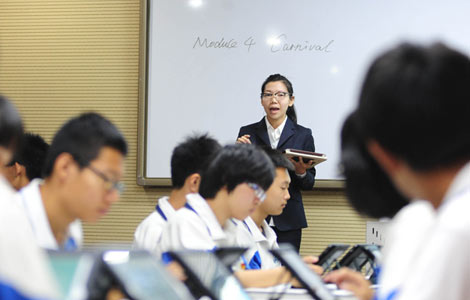Growing American pessimism vs high Chinese optimism
Updated: 2013-12-04 11:41
By Chen Weihua (China Daily USA)
|
||||||||

There seems to be plenty of reasons for pessimism in China. The world's largest developing nation and the second-biggest economy is experiencing an economic slowdown and multiple challenges, including severe pollution, corruption and income disparity.
On the other hand, the United States, the largest economy, continues to claim itself as the world's leading democracy. Its economic and military might, technological prowess and soft power are still unrivaled. The prospect for energy self-sufficiency has added a huge advantage to the world's only superpower. All this should provide ample reasons for optimism in a nation known for its can-do attitude.
But that's not the case, according to the latest Pew Center and Gullup surveys.
A Gallup poll on Nov 26-29 shows that President Barack Obama's approval rating hit only 42 percent while disapproval stayed at 51 percent.
And the Gallup's Economic Confidence Index - which is based on Americans' assessments of current economic conditions in the US and their perceptions of whether the economy is getting better or worse - continues to deteriorate.
Americans' net economic outlook score was -28 the week before Nov 26, down from -26 the prior week. The new score represents 34 percent of respondents who said the economy is getting better and 62 percent who said it is getting worse.
Though the public perception of future economic conditions is better than the -46 measured during the US government's shutdown, it has a long way to go to reach the -11 from mid-September, according to the survey.
Public trust in government, already quite low, had gone even lower in a survey conducted just before the Oct 16 agreement to end the shutdown and raise the debt ceiling. Just 19 percent said that they trust Washington to do what is right just about always or most of the time. That was a drop of 7 percent since January and down significantly compared with the 73 percent trust figure registered for the federal government in 1958, according to a Pew survey released on Oct 18.
The same report revealed that only 23 percent of the 1,504 people polled Oct 9-13 have a favorable opinion of Congress, while 73 percent have an unfavorable view.
The pervasive pessimism and negative view contrasts sharply to anther Pew survey in early November that Asia offers the most positive economic evaluations, with a median of 52 percent giving their economy a favorable assessment.
The relatively high positive assessment is driven by high ratings in only four of the eight nations polled in the region, China, Malaysia, the Philippines and Australia. Views in Indonesia, Japan, the Republic of Korea and Pakistan remain largely negative.
Overall, China led all nations on optimism among its population, with 88 percent thinking their economy is in a good situation and only 10 percent saying it's in a bad situation, according to the 2013 Pew Global Attitudes Project which covers 39 nations.
That high optimism contrasts to 33 percent of Americans who think their economy is in good condition and 65 per cent who said it's bad.
The 33 percent optimism rate for Americans also contrasts to the average median rate of 41 percent for Africans, 52 percent for Asians and 44 percent for Latin Americans, but 27 percent for Middle Easterners and 18 percent for Europeans.
China also had the highest optimism rate respondents' hope for their children, with 82 percent saying their children will be better off than parents. Only 7 percent said the next generation will be worse off.
On the contrary, only 33 percent of Americans said their children will be better off while a majority of 62 percent said the next generation will be worse off.
The American pessimism compares with a median average of 51 percent for Latin Americans, 57 percent Asians and 50 percent Africans, who said their children will be better off. Americans' optimism in their children's well-being only beat Middle Easterners (31 percent) and Europeans (26 percent).
The high level of Chinese optimism was also reflected in previous years' Pew surveys.
Neither did Pew nor Gallup surveys give reasons for Chinese' optimism and Americans' pessimism. But China's rapid economic growth for the past decades, which has greatly raised people's living standards and national pride, might have fueled the bright outlook.
The US, on the other hand, is going through a relative decline with the rise of the rest, including countries such as China, India and Brazil.
It might also be caused by Americans being traditionally more critical of their government and leaders, while most Chinese have grown up to respect their government and leaders. Or it might be true that Americans have a stronger sense of crisis while the Chinese are either blindfolded by the crisis or they actually see crisis as both danger and opportunities, as weiji, the Chinese word for crisis, literally suggests.
Contact the writer at chenweihua@chinadailyusa.com
(China Daily USA 12/04/2013 page2)
Most Viewed
Editor's Picks

|

|

|

|

|

|
Today's Top News
DPRK leader's uncle stripped of all posts
United Way improves traction in China
China's inflation up 3% in Nov
China issues guidelines on official receptions
Winning season for ZTE USA and Rockets
3rd Plenum 'a success': expert
ROK decides to expand air defense zone
Trade surplus hit record high in Nov
US Weekly

|

|















